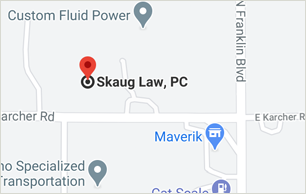Are You Protected Working in Multiple States? Your Workers’ Compensation May Only be Valid in One State
Last updated Monday, July 15th, 2024

Do you operate in some of Idaho’s neighboring states? What happens when you hire someone in one state then send that employee to work in another? Does workers’ compensation cover your business in this situation? Does workers compensation cover your employee in this situation?
Workers’ comp can be confusing. What to understand which benefits apply to which employees working where? There are a couple of ways to get more detailed answers.
- Ask an Experienced Workers’ Compensation Attorney. If you’re an employee who gets injured on the job, meeting with a legal expert can help. Our team at Skaug Law can analyze your claim.
- Contact the Idaho Industrial Commission. If you’re a business who has had an employee who has been injured, this group offers many great workers’ comp resources for you. Visit online or call with questions. The helpful people in the compliance department usually have answers.
Employees aren’t the only ones who need to be protected. Even when doing the right thing, employers need protection too! Allow Skaug Law to be your resource. We can assist you with employee appeals, rejected settlements and related situations. Work with us, so we can work for you!
Three Ways Each State Exercises Its Own Jurisdiction
Idaho borders Washington, Oregon, Nevada, Utah, Wyoming and Montana. Running a company here often means conducting business beyond Idaho borders. It’s good to know how things work in other states.
States may apply their own jurisdiction when:
- An employee gets hurt in a different state than where work is primarily done (40 states)
- An employee is hired inside those state lines (43 states)
- An injury occurs within that particular state (all states)
Some of these rules are about as clear as mud. Send stress packing with one call to Skaug Law. Our attorneys can unravel this tangled ball of unknowns in minutes. We know Idaho workers’ comp and how it translates elsewhere. We can review your case, sort out issues and set your mind at ease.
View Your Certificate of Insurance – What to Look for
A certificate of insurance (COI) is written proof that your company has workers’ compensation. Insurance providers issue these important documents. Clients, vendors, contractors and employees may ask to see these certificates.
Read over every COI related to your business, as some policies may be state-specific. Comply with state laws by checking every so often. Be sure to confirm:
- Coverage. Figure out if coverage extends to owners, partners, directors, members and/or other agents with a vested interest.
- Liability. Understand the amounts that policies cap out for which parties.
- Recovery Limits. Waivers of subrogation can shield parties against legal action. Review any of these agreements.
Liability for emergency medical assistance by medically trained persons.
Have You Been Injured at Work?
Get Your Free Injury Case Review
Hire an experienced Idaho workers’ compensation lawyer that knows what needs to be done. The minute you sign with Skaug Law – we start working.
Can Insurance Companies Help Establish Coverage?
Which people will be covered under your workers’ comp policy? Employees? Day laborers? Seasonal workers? Subcontractors? And who decides such coverage?
While insurance companies are certainly involved, states are the top dogs in this field. The Idaho Industrial Commission notes that any Idaho business with at least one employee must have workers’ comp. This state determines which workers are classified as employees, effectively pointing out who is covered.
The IIC goes on to say that Idaho may view contract workers as employees. Stay in compliance by reaching out to the Idaho Industrial Commission. Consideration for coverage requirements is done individually.
Who Can be Excluded from Workers’ Compensation in Idaho?
Most employees need workers’ compensation coverage. But there are certain folks that get a free pass. According to the Idaho Industrial Commission, you generally aren’t required to carry workers’ comp for the following:
- Aerial applicators in specific circumstances
- Anyone doing work at random times that is unrelated to employer’s business
- Authorities of athletic events for grades 7 through 12 (like referees or judges)
- Corporate officers who are also directors (if applicable) who own a minimum of 10 percent of company stock
- Domestic workers on your property (such as gardeners, housekeepers and nannies)
- Family members who live in employer’s residence when business is sole proprietorship. An election for exemption may be filed for specific family members who live elsewhere.
- Federal employees
- Outworkers (workers who are given materials and directions but work at home)
- Real estate sales agents and brokers when income is generated solely through commission
- Sole proprietorship owners
- Working members of limited liability company (LLC) or partnership
- Volunteer ski patrollers
Is Workers’ Compensation Based on Where You Live or Where You Work?
Policies can be purchased based on where your business is located. The IIC explains that temporary work in different states goes through Idaho workers’ comp. If assignments are longer, an extraterritorial certificate can be produced for your workers when you have a current Idaho policy.
When your employees work in other states, you need to be sure there are no gaps in coverage. Make sure your policies align with Idaho workers’ comp laws.
As an employer you have many responsibilities. One the most important? The financial health of your business. Learn more by contacting the Idaho Industrial Commission. Getting questions answered allows you to head off any problems at the pass.

